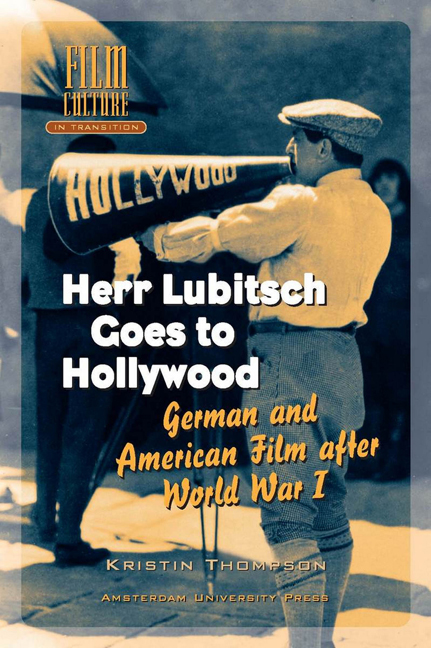Book contents
- Frontmatter
- Dedication
- Contents
- Acknowledgements
- Introduction
- Chapter One Lubitsch’s Career
- Chapter Two Making the Light Come from the Story: Lighting
- Chapter Three Subduing the Cluttered Background: Set Design
- Chapter Four Guiding the Viewer’s Attention: Editing
- Chapter Five Peeking at the Players: Acting
- Chapter Six Mutual Influences
- Epilogue: The Lubitsch Touch
- Notes
- Filmography
- Index
- Film Culture in Transition
- Plate Section
Chapter One - Lubitsch’s Career
Published online by Cambridge University Press: 14 January 2021
- Frontmatter
- Dedication
- Contents
- Acknowledgements
- Introduction
- Chapter One Lubitsch’s Career
- Chapter Two Making the Light Come from the Story: Lighting
- Chapter Three Subduing the Cluttered Background: Set Design
- Chapter Four Guiding the Viewer’s Attention: Editing
- Chapter Five Peeking at the Players: Acting
- Chapter Six Mutual Influences
- Epilogue: The Lubitsch Touch
- Notes
- Filmography
- Index
- Film Culture in Transition
- Plate Section
Summary
Studying the Conditions of Influence
The Russian Formalist literary theorist Jurij Tynjanov has pointed out that the historian who searches for influence treads a difficult path. The devices an artist borrows from other works may be so transformed in his or her hands as to be unrecognizable to the observer. Here the artist's own declaration of having been influenced is the crucial evidence needed for the historian to realize that influence has probably taken place (unless the artist is lying or self-deceiving). Tynjanov mentions another danger, in which the same device is used in different artworks at the same time – and yet this apparent case of influence is in fact merely a coincidence. Two or more artists have introduced similar devices independently. During World War I, directors in different countries employed cuts involving graphic matches; these filmmakers most likely did not see each other's work, but they hit upon similar ways of exploring film style.
Tynjanov sums up the subject of literary influence succinctly: “Influence can occur at such a time and in such a direction as literary conditions permit.” The same is true in film. When we speak of studying influences, we are necessarily studying mental events, which are never completely recoverable. But when we study artists’ mental events, we are dealing with people who have left considerable traces of influences, in their artworks and often in their words, in interviews and writings. Moreover, filmmakers depend to a large extent on companies and on collaboration with their casts and crews. The coordination of all these people and their contributions to a film often involves a set of shared principles and guidelines, sometimes expressed explicitly in “howto” texts, sometimes implicit in the stylistic similarities among artworks. In some cases, the films and the texts relating to them, along with a knowledge of the overall filmmaking context of the day, allow us to make rather precise statements and arguments about the conditions of influence. Ernst Lubitsch and the post-World War I German cinema provide a particularly clear case of profound and sudden influences from a single source – Hollywood cinema – upon a great filmmaker and the national cinema of which he was the most illustrious member.
Lubitsch himself declared that he was strongly influenced by Hollywood films, but by examining the conditions of influence, we can specify how and when the changes took place.
- Type
- Chapter
- Information
- Herr Lubitsch Goes to HollywoodGerman and American Film after World War I, pp. 17 - 34Publisher: Amsterdam University PressPrint publication year: 2005



